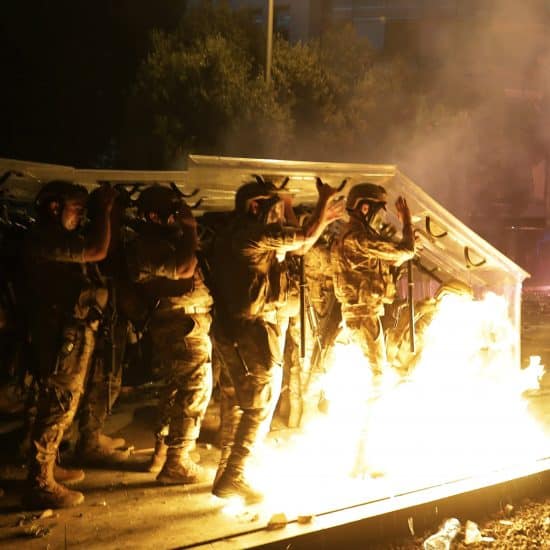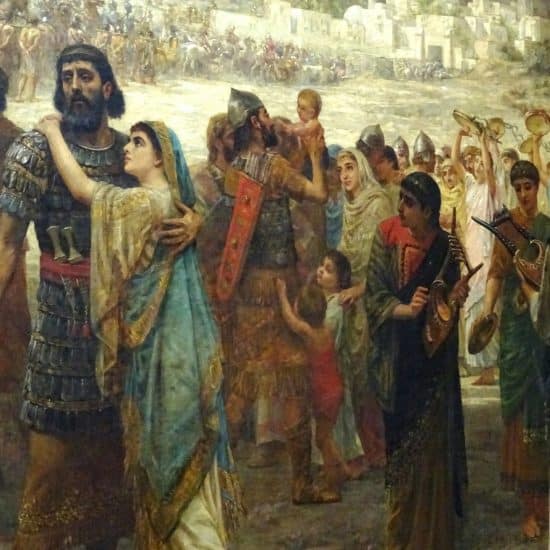 Deborah’s courage
Deborah’s courage
Formations: July 17, 2015
Scripture: Judges 4:1-9, 14-16, 23-24
 Michael OlmstedWhen reading scripture, two things always surprise me: first, that God keeps offering us grace when we mess up and, second, that God’s way is beyond our expectations. In Judges the spiral of Israel’s sin-punishment-deliverance keeps going. Enter Deborah, the only female judge and only one of only four women in the Old Testament who is called a prophet. In only two chapters of Judges (4-5) her story is told, first in poetry, then prose.
Michael OlmstedWhen reading scripture, two things always surprise me: first, that God keeps offering us grace when we mess up and, second, that God’s way is beyond our expectations. In Judges the spiral of Israel’s sin-punishment-deliverance keeps going. Enter Deborah, the only female judge and only one of only four women in the Old Testament who is called a prophet. In only two chapters of Judges (4-5) her story is told, first in poetry, then prose.
Deborah was remarkable in many ways. She was the only “judge” in Judges who actually practiced arbitration and problem-solving for the people. The text describes her as “a leader of Israel” who “would sit under Deborah’s palm tree between Ramah and Bethel in the Ephraim highlands, and the Israelites would come to her with their disputes” (vv. 4-5). Do you suppose there was any muttering among the populace about “that woman usurping a man’s place”?
Israel had already been through two judges, Ehud and Shamgar (Judges 3:12-31), and had returned to idol worship and ignoring God’s Law. They faced the harsh oppression of King Jabin of Hazor and his powerful army, led by Sisera. The intimidating description of this Canaanite enemy was their army of “900 iron chariots” (v. 3). At that time iron weapons were advanced technology, compared to bronze or stone, a further hint that Israel needed a miracle from God.
Deborah – prophet, judge and leader – is described in our English translation as “wife of Lappidoth,” but that phrase may also be translated “woman of torches” (v. 4). There is no other mention of her husband in the Bible. “Woman of torches” is more descriptive of Deborah as God’s military torch blazing in the darkness of Israel’s oppression.
Deborah sent word to her military commander, Barak, for him to report (v. 6). Then she issued this command: “Hasn’t the Lord, Israel’s God, issued you a command? ‘Go and assemble at Mt. Tabor, taking ten thousand men from the people of Napthali and Zebulun with you. I’ll lure Sisera, the commander of Jabin’s army, to assemble with his chariots and troops against you at the Kishon River, and then I’ll help you overcome him’” (vv. 6-7).
Was she implying Barak knew but had hesitated to act on God’s command? Barak agreed to march but only on the condition Deborah accompany him. Did he fear defeat? Was he uncertain his men would follow him against this daunting army unless their respected judge was present? Perhaps, as the common custom of that day, the army sought the blessing of God’s prophet before entering battle.
Deborah confronted Barak’s hesitation: “I’ll definitely go with you. However, the path you’re taking won’t bring honor to you, because the Lord will hand over Sisera to a woman” (v. 9). On the day of battle, Deborah had to apply more pressure to Barak: “Get up! This is the day that the Lord has handed Sisera over to you. Hasn’t the Lord gone out before you?” (v. 14).
God delivered Israel as the superior enemy army was destroyed. Read details of the battle in Judges 4:17-24. God brought a rainstorm and flood that disabled the iron chariots. Sisera fled on foot and was killed by a woman named Jael with a tent peg! Israel grew stronger until it completely defeated King Jabin.
Of all the judges, Deborah is celebrated in the most glowing terms, even described in Judges 5:7 as “a mother in Israel.” A woman in such a leadership role is unusual in the Old Testament, but we must not view Deborah as some kind of “God’s last hope since no man volunteered.” The Bible does not rank people by their gifts, weaknesses or gender. Search the Scriptures and you will find mothers who championed their sons, prophets, queens, financial supporters of Jesus and deaconesses whom God used significantly to accomplish his will.
Today’s story emphasizes Deborah’s interactions with Barak. While we may see him as weak or reluctant, in all fairness Barak may have struggled with Deborah’s significant position while placing high confidence in her unmistakable relationship with God. Is there a message here that each person, regardless of social standing or power, is a significant part of God’s unfolding purpose? In I Corinthians 12 Paul teaches the importance of all spiritual gifts and the completeness found when all the members of the church (body) are respected and valued.
Our task is to learn valuable lessons for living from these fascinating stories set in a time and culture far removed from our day. Consider the crises we encounter, whether in our personal world or the larger world that the media shoves in our face daily. Are we like Deborah, strong, self-assured leaders? Are we more like Barak, seeking the leadership and spiritual vision of others before we take action? Some people are able leaders, organizing, laying out a vision, determined to bring hope and help to others. Some put the pieces together, make the plan work, get involved in the details and doing. What are your abilities and motivations?
Which comes first: faith or courage? Rather than rank the two, why not couple them? Barak was a military commander who had specific skills and experience, but he needed an understanding that God defines the purpose of his task. Deborah provided that clear purpose. Her faith informed his courage so that he acted beyond his knowledge of a superior military enemy. Barak discovered his own faith and acted on it. He was not the hero of this story and did not receive the glory a man might desire. But the point is not whether or not Deborah or Barak is the hero.
The point is that God loves us and God can use each of us in distinctive ways to bring hope to our shattered world. Are you willing, in spite of your perceived circumstances, to serve God in the face of a crisis?
Retired after 46 years in pastoral ministry, Michael K. Olmsted enjoys family, supply preaching and interim work, literature, history, the arts and antiques.
Formations is a curriculum series from Smyth & Helwys Publishing, Inc. through NextSunday Resources.
The PDF download requires the free Acrobat Reader program. It can be downloaded and installed athttps://get.adobe.com/reader.



